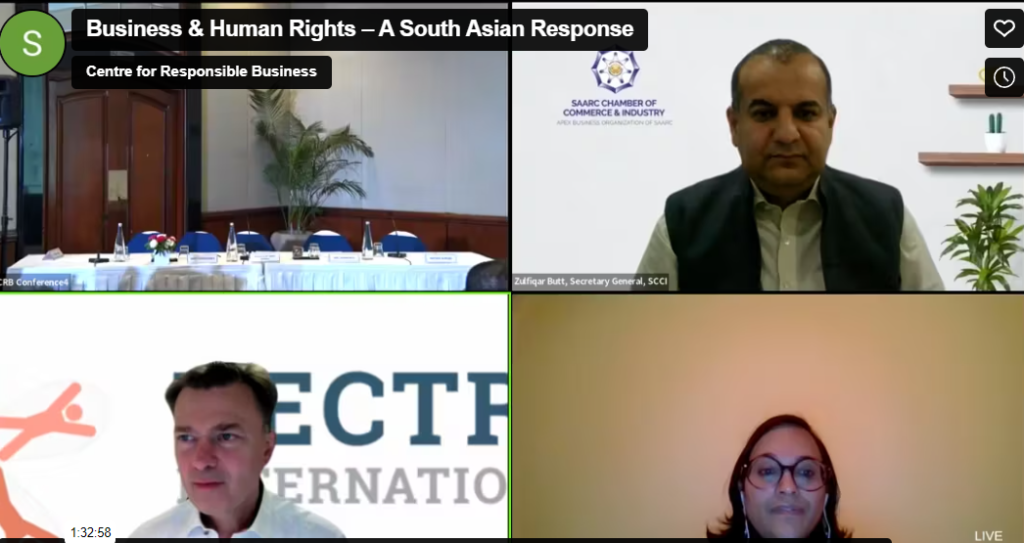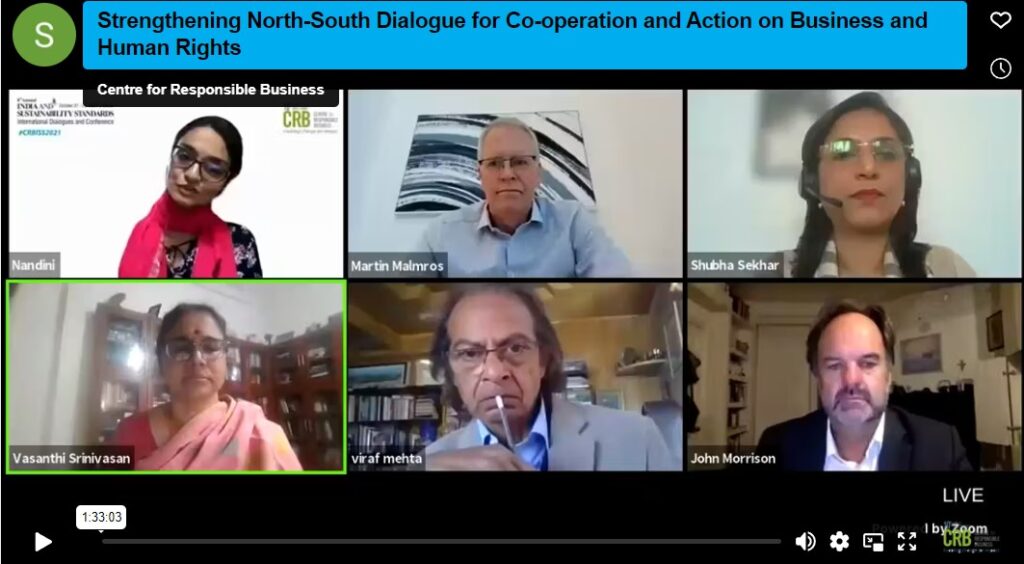Business & Human Rights
At CRB, we understand Business and Human Rights are integral to the realization of India’s Constitutional vision of equitable and sustainable growth for all. For any economy to be resilient, it should be founded on just & fair inter-relationships. In India, the centrality of this philosophy is embodied in the Constitution as part of the fundamental rights & directive principles. Today, in the wake of the COVID19 pandemic, we find business & human rights at the heart of the ensuing humanitarian crises. Globally, the pandemic has exposed & accentuated the fault lines that exist in our current growth/development models. There is a crying need to redefine growth and bring human rights to the centre of all endeavours to restore normalcy. There is today, both among businesses and its stakeholders, a growing acknowledgement of building “businesses with a purpose” that goes beyond conventional norms of shareholder capitalism. Rising to the need of the hour, CRB has intensified its work on business and human rights even more & will continue to do so in the following year as well. CRB foresees taking forward its knowledge, expertise and networks built over the years and translating it into actions for promoting business and human rights across sectors. To further the understanding and application of B&HR by enterprises, CRB, in partnership with Friedrich Naumann Foundation (FNF), has conceptualised and developed a series of awareness building videos.
Awareness Building Videos:
To further the understanding and application of B&HR by enterprises, CRB, in partnership with Friedrich Naumann Foundation (FNF), has conceptualised and developed a series of awareness building videos.
The business and human rights form the cornerstone of all the work undertaken by the Centre for Responsible Business, it cuts across the different thematic and operational works areas. Going forward, our endeavour will be to strengthen and diversify the vertical to include various other aspects of business and human rights.
This Factsheet provides an overview of CRB’s initiatives and activities in the field of business & human rights and the way forward.
Multi-Country Tea Origins Supply Chain Risk Review
In partnership with the Committee on Sustainability Assessment (COSA), CRB studied the human rights risks and impacts in tea value chains in India and Sri Lanka through engagement with relevant industry stakeholders and ecosystem actors. CRB will also be developing a remediation framework listing all the relevant human rights risks and impacts, potential remediation measures and priority interventions in both countries.
An initiative of CRB and funded by Friedrich Naumann Foundation (https://www.freiheit.org/ ), the Business & Human Rights (BHR) Network is an engagement platform for South Asian businesses to interact with important stakeholders to understand and explore opportunities in BHR. The objective is to simplify BHR and encourage uptake to enhance responsibility, competitiveness and resilience. Learn more here: BHRN (bhrnetwrk.com)
Webinar Series
As part of a joint initiative, three partner organisations; Friedrich Naumann Foundation (FNF), CRB and IGCC (Indo-German Chamber of Commerce), are working together to organize a series of quarterly webinars on a range of topics focusing on the different aspects of Business and Human Rights from a practitioner’s standpoint. The overall objective of the webinar series will be to provide businesses practical guidance on enhancing the adoption and integration of business and human rights in policy and practice. The series will also endeavour to build on the existing understanding of national frameworks that promote Business and Human Rights.
The series was kickstarted on the International Human Rights Day, i.e., December 10, 2020 with a focus on understanding of the UNGPs, introduction to NAP and aligning India’s journey with the substantive aspects of Pillar 2 of the UNGPs (Corporate Responsibility to Respect).
High Level Panel Discussion, ISS 2020
As part of CRB’s 7th flagship Annual Conference – ‘India and Sustainability Standards’ scheduled between October 28 to October 30, with the theme of ‘Sustainability a Key to Business Resilience in an Uncertain World’, CRB, in partnership with Friedrich Naumann Foundation for Freedom (FNF) South Asia, curated a high-level panel discussion on Responsible Business particularly in the light of the recently notified disclosure and reporting guidelines (BRS) and an impending NAP. The panel attempted to weigh in on some of the ways and approaches in which professional bodies will help businesses understand and adopt the responsible practices and understand good practices adopted by progressive companies and discuss the business case for responsible conduct.
National Action Plan (NAP) on Business & Human Rights
Rights & Responsibilities of Women Textiles Workers
This Rights and Responsibilities (R&R) program was co-developed by leading apparel and textiles brands/buyers who source from Indian suppliers, many of who are SMEs. The aim of this intervention led by CRB, has been to help owners and managers of apparel factories understand the importance of protecting the rights of women workers, from the perspective of ensuring long-term business relations with these brands..
The Program employs five short films on key worker-centric issues – Health & Safety, Misconduct, Good Working Environment, Overtime, Worker Representation, as the primary training tool, and further provides the necessary reading & communication supporting material (in the form of a training manual and posters) and implementation support (virtual and in person) to equip and enable suppliers to effectively use these films to train factory workers, thereby driving increased awareness on their (worker) rights and responsibilities.
Child-Friendly Supply Chains in the Garment Sector
CRB partnered with Global March Against Child Labour (Global March) to develop a Practical Guideline for Child Friendly Supply Chains – for The Garment Sector. This Guideline has been developed to identify and mitigate human trafficking, particularly of children, girls and young women in the supply chain of the garments sector, especially for Dutch Companies with its production network in India and other developing economies. The Guidelines relies on the framework advanced by the UN Guiding Principles on Business and Human Rights (UNGPs) and evidences/experiences of Global March and CRB on supply chain sustainability and human rights issues in the garment supply chain.
HRDD to Assess Risks Associated with Engagement of a Large MNC Energy Company
CRB undertook a detailed human rights due diligence (HRDD) exercise to assess human rights risks associated with the engagement of a large MNC energy company with contract workers and communities across its various portfolios in India. CRB has developed a detailed and robust methodology to undertake HRDD exercise, based on international tools/methods for assisting businesses to understand current/potential human rights risks, using the UNGPs framework. A HRDD exercise is a first step to initiate actions to address human rights problems related to business operations.
HRDD for A Multinational Steel Company
CRB undertook an in-depth human rights due diligence for a Multinational Steel company. The analysis comprised secondary and primary data analysis and assessment of the company Business & Human Rights Policy. Importantly, based on the analysis and findings, an overarching Business & Human Rights framework was recommended, compiling solutions and good practices in the steel sector
Self-Assessment Framework on Business & Human Rights for Indian Apparel & Textile Industry
Self-Assessment Framework on Human Rights, specially designed for Indian A&T industry keeping in view the socio-cultural and management nuances of the region.
The Self-Assessment Framework will help you to:
- Assess human rights risk in your business with no involvement of third party
- Focus on women centric issues specially existing in India
- Measure your performance on SDGs and BRSR Principle 3,4,5.
- Take actions on high risks areas using the suggestive list of remedial actions
To know more about the framework click here.
Events
Venue – Mumbai
The purpose of this panel discussion was to deliberate on the emerging global trends and expectations and assess the preparedness of South Asian businesses. The Panel elaborated on the global shift and focus on human rights and environment impacts in business operations and reflected on ways businesses can enhance competitiveness with respect to ESG indicators and thereby amplify market access and investments. To read more about the event click here: https://bhrnetwrk.com/event/44
An attempt was made on unboxing potential implications of human rights due diligence law/practices on important stakeholders, specifically businesses in South Asia. Moreover, the deliberations included recommendations for South Asia supply chains to become more resilient and competitive. To view the recording click here

Made in India_ Promoting Growth and Resilience through the UN Guiding Principles on Business and Human Rights
ISS 2020 – Plenary- India Inc Leads by Example – Responsibility in Revival






































































































